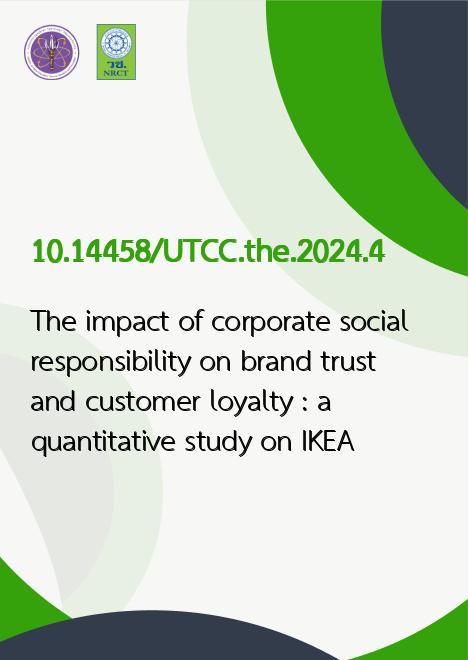
|
The impact of corporate social responsibility on brand trust and customer loyalty : a quantitative study on IKEA |
|---|---|
| รหัสดีโอไอ | |
| Title | The impact of corporate social responsibility on brand trust and customer loyalty : a quantitative study on IKEA |
| Creator | Steinarsdottir, Selma Charlotte |
| Publisher | University of the Thai Chamber of Commerce (UTCC) |
| Publication Year | 2567 |
| Keyword | Ikea (Firm), Social responsibility of business -- Sweden, Sustainable development -- Sweden, Customer loyalty -- Sweden |
| Abstract | Recent years have witnessed a significant surge in consumer demand for sustainability, a trend particularly evident in Sweden's proactive pursuit of global sustainability goals. Despite Sweden's esteemed reputation as a sustainable nation, certain areas such as sustainable consumption and climate action necessitate further focus. Surveys conducted in the region consistently underscore Swedes' acute awareness of climate issues and their prioritization of companies' sustainability efforts. In response to this shifting consumer landscape, companies, including the multinational retailer Ikea, have markedly intensified investments in Corporate Social Responsibility (CSR). However, amidst this emphasis on CSR, discrepancies persist between consumer rhetoric around sustainability and their actual shopping behaviors, adding complexity to CSR strategy formulation. The primary objective of this study is to explore the relationship between CSR, Brand Trust, and Customer Loyalty, focusing specifically on Ikea's extensive customer base in Sweden. Additionally, this study seeks to provide insights and recommendations to enhance Ikea's CSR initiatives and their impact on Brand Trust and Customer Loyalty, thereby contributing to the ongoing discourse on CSR and consumer behavior. A comprehensive review of existing literature forms the foundation of this study, providing valuable insights into the dynamics of CSR, Brand Trust, and Customer Loyalty. Scholars such as Abd-El-Salam (2020) and Liu et al. (2019) have highlighted a significant positive correlation between CSR initiatives and Brand Trust. They emphasize the importance of aligning CSR activities with consumer needs and values to foster trust and reliability. However, dissenting perspectives from Gı̇ Lanli and Erdoğan (2022) suggest an indirect linkage between CSR and Brand Trust, mediated by customer satisfaction. Similarly, the relationship between CSR and Customer Loyalty is explored, with findings from Liu et al. (2019) and Abd-El-Salam (2020) indicating an indirect influence through Brand Trust. In contrast, Tran (2022) presents a divergent viewpoint, suggesting a direct impact of CSR on Customer Loyalty, alongside its indirect influence through Brand Trust. Moreover, the interplay between Brand Trust and Customer Loyalty is examined, with scholars emphasizing trust as a foundational element for fostering long-term customer loyalty and retention. The survey, conducted exclusively in English, was distributed via Google Forms on the author's social media platforms and shared in two Swedish Facebook groups focused on interior design. This study utilizes a comprehensive methodology to analyze data and explore the relationships between variables. Descriptive statistics are employed to summarize data effectively, while correlation and regression analyses assess the connections and significance between variables. Process macro analysis evaluates whether Brand Trust acts as a mediator. Data reliability and validity are ensured through an alpha test. In conclusion, this study aims to provide nuanced insights into Ikea's CSR strategy and its implications for Brand Trust and Customer Loyalty. By offering actionable recommendations for enhancement, this research endeavors to contribute significantly to the burgeoning literature on CSR and consumer behavior, particularly within the Swedish. |
| URL Website | https://scholar.utcc.ac.th |
| Website title | UTCC Scholar |
